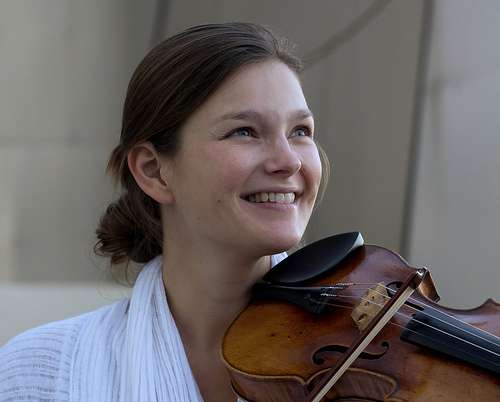|
Back
Sounds Without Fury New York
Isaac Stern Auditorium, Carnegie Hall
12/07/2011 -
Matthias Pintscher: towards Osiris
Wolfgang Amadeus Mozart: Violin Concerto Number 5 in A Major, K. 219 (“Turkish”)
Johannes Brahms: Symphony Number 4 in E minor, Opus 98
Janine Jansen (Violin)
London Philharmonic Orchestra, Vladimir Jurowski (Principal Conductor)

J. Jansen (© Martin Chalfour Photos)
Great Britain during most of the 18th and 19th Century was an oxymoron. Without a single major composer, with grossly plebeian taste for huge effects, London was still the most attractive venue for soloists and performers throughout Europe. Haydn and Dvorák wrote their finest works for London’s orchestras, and soloists pressed their concert managers to take them across the stormy British Channel to play for British audiences.
Last night’s performance, the first of a pair from the London Philharmonic Orchestra (LPO), displayed exactly why this was so.
Ignore, for a moment, the Russian conductor, the Dutch soloist, and the three German works from three different centuries. The magnet was the LPO itself. The strings in the Brahms symphony glowed from beginning to end. The brass (especially the horns in the second movement) made one wans to tally-ho into a fox-hunt. The winds could have been tootled by Raphael cherubs.
For technical prowess, they could not have been equaled in Matthew Pintscher’s towards Osiris, the six-minute prologue to his more substantial Osiris. The composer himself was visibly moved by such pinpoint playing, but he couldn’t have been surprised at such brilliant playing.
The Mozart “Turkish” Concerto was the only time one didn’t listen to the LPO with fascination. After all, this was Janine Jansen as the violin soloist, and from her frequent appearances here, everything she plays turns to gold.
Partly, this was due to her so sweet “Barrere” Stradivarius. But more, it was the way this young artist respects her music. The first movement was a marvel of nuance, lightning-quick responses, immaculate phrasing. Equally, Ms Jansen took the final rondo not with headlong velocity but with an appreciation for every little melody, including a respectful rendering of the Turkish parody.
But that second movement Adagio was the most ravishing movement of the entire evening. It was played not with undue delicacy but with a far more difficult task. Ms. Jansen performed it as Mozart composed it. Not extra nuance, no undue rubati. The results were moments that were as near religious as anything in the evening.
At the conclusion of the movement, one had to think, “Well...this is it. Things simply don’t get better.” Hardly a professional comment, but no other words describe her.
The Pintscher opening could not be compared to Osiris. It was six minutes of brilliant orchestral writing. From chattering trumpets to a massive use of percussion, an exercise of unfailing expertise. Yet, looking back, that’s what it was: an exciting but ephemeral exercise.
And now onto the Brahms. I loved it more for the LPO playing than conductor Vladimir Jurowski’s performance. Nobody could call the 40-minute work a compact symphony, but Mr. Jurowski did a few things to lengthen it further. The tempo of the first movement was orthodox, but he took pauses–minute pauses–some half dozen times, as it to emphasize the following passages. It was hardly unnerving, it was certainly personal, but one felt it unnecessary.
The Andante moderato was not slow, but it was leisurely. Very leisurely. If one gave it a title, it would have been stolen from Turgenev’s A Month In The Country, strolling through its gardens of sound as if a personal revery. Yes, he conducted an exciting third movement, but the finale, like the first movement, lingered and pushed hard at different places.
So brilliantly composed was this passacaglia, that many listeners don’t even realize that the movement is a set of variations, but the great conductors can give it that thread, which was ;lost at times last night.
Mr. Jurowski is certainly a great conductor, and the LPO is perhaps the most beautiful orchestra in the world. If that Brahms was a bit quirky, all was easily forgiven. Such sounds are rare and, in a way, almost comforting.
Harry Rolnick
|